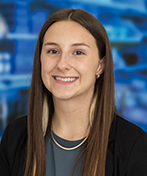
School: Arizona State University
Hometown: Peoria, Arizona
PI: Danielle Metz
Helios Scholar
In recent years, mistrust between researchers and the public has been exacerbated by educational, historical, and institutional factors. Trends indicate the majority of Americans believe scientists are not sufficiently transparent, according to Pew Research. A survey of previous MindCrowd Mobile Lab (MLab) participants was conducted to evaluate their opinions regarding trust in the scientific community and government organizations involved in research. As respondents had previously participated in a research study, they were likely biased in favor of science; regardless, they reported experiencing a slight increase in their trust in research following their participation. Perceptions of government organizations were less positive, with 10% of survey participants reporting negative opinions; there was a notable correlation between these feelings and engagement with right-leaning biased science news. To address research mistrust, it is imperative that clinical research coordinators (CRCs), researchers as individuals, and TGen as an institution work together to increase research transparency. Strategies include returning more results to participants, adjusting incentives, and revising consent form language to be more understandable. We also assessed demographic information to determine whether the MLab has reached underserved communities as intended. Our survey data revealed that self-reported participant diversity has thus far not correlated with Arizona census data. Reevaluating the methods used to reach historically underserved groups, in particular, is essential to increase diversity and accuracy within our data to mitigate epistemic injustice. By emphasizing transparency and inclusivity in research, we can rebuild trust in science and ensure that our studies reflect and respect the diverse communities we serve.